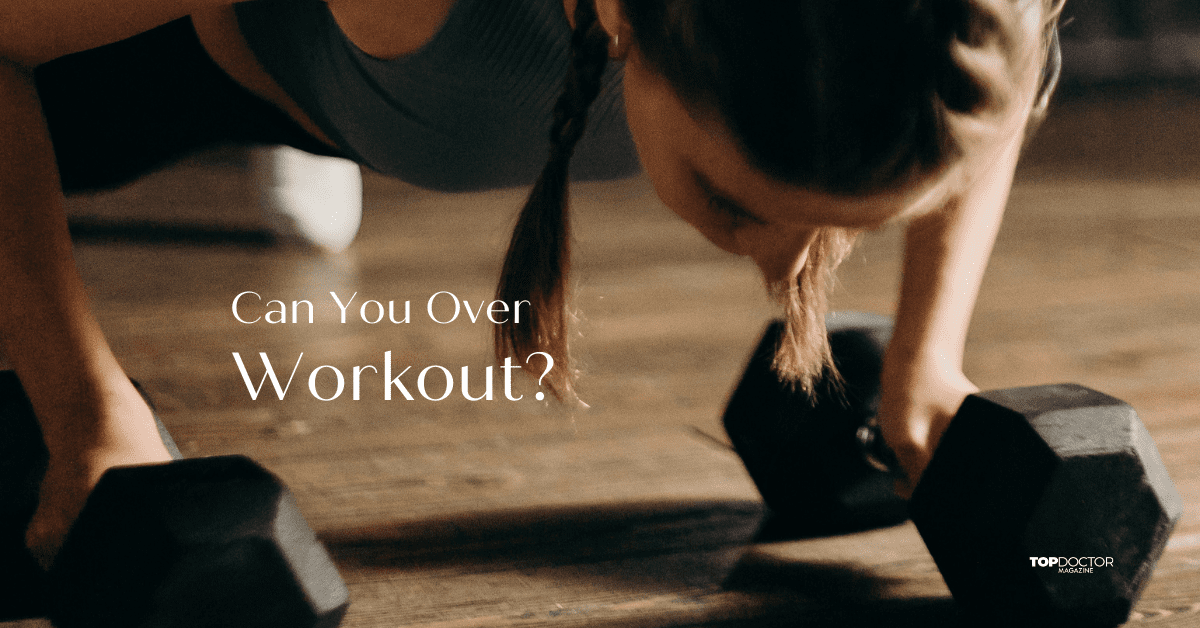Whether running on the treadmill, doing jumping jacks at home or hitting the gym, exercise is essential for staying in top-notch shape. But is it possible to exercise too much?
Several tell-tale signs can tell that a person is exercising more than recommended. There isn’t exactly a metric or number for over-exercising, but the body will make it known if someone is overdoing it. Understanding when you’re pushing your body’s limits can help decrease the risk of any injuries or even addictions.
Benefits of Working Out
Exercise is imperative to stay healthy and fit. It burns calories, releases serotonin and regulates stress levels. Furthermore, exercise reduces the risk of any cardiovascular diseases or disorders and even keeps the brain healthier, lowering the risk of brain disorders. Working out, coupled with healthy eating and enough sleep, leads to a healthy lifestyle. There is no doubt about the wonders of exercise, but what are the dangers of exercising too much?
How to Tell if You’re Working Out Too Much
As the saying goes, all things in moderation, as too much exercise can contribute to extreme fatigue or injuries and may even become an addiction.
The body is programmed to alert you about the fatigue and burnout accompanying over-exercising. Changes in appetite, a reduction in energy and a propensity for injury are the most common ways the body signals you to slow down.
One tell-tale sign of overworking out is prolonged muscle soreness. Sore muscles after working out are normal but become worrisome if they last for more than three days after a workout.
Another sign of over-exercise is insomnia. Proper exercise promotes sleep, but too much exercise results in sleeplessness.
Fatigue and decreased performance are additional indicators of overworking the body. This is because the body hasn’t had time to rest due to the constant exertion of working out.
In addition to changes in performance and energy levels, exercising too much can cause changes in diet. Some common changes include an altered appetite or fat gain. Conversely, overworking can result in either a lack of hunger or extreme hunger.
While it may seem counterintuitive, overexercising can actually harm the immune system, causing people to develop a propensity to colds and flu. On the other hand, moderate exercise is a great way to boost the immune system.
In addition to physical harm, working out too much can lead to depression. While exercise is a great way to boost hormone levels that release chemicals associated with happiness, too much exercise keeps hormones from regulating properly and leaves people feeling sad or lethargic.
Something interesting about exercise is that, like anything, it can become an addiction. Research suggests that approximately 10% of high-performance runners are exercise addicts. This can take a toll on mental health, resulting in physical, mental and emotional issues.
How to Balance Working Out
First, don’t let the listed dangers deter you from exercising. It’s still important to do so! Just remember to exercise in moderation.
Seek medical attention and get some extra rest when suffering a physical injury from training, such as pulling a muscle or wrist pain. Medical professionals will give the injury the proper attention and prescribe specific healing methods. Do not attempt to continue working out, even if it’s just a slight pain. It’s easier said than done, especially if exercising is a fixed routine.
Take time off from exercising. Again, this is easier said than done. Perhaps it sounds a little drastic, but fitness experts recommend taking an entire week off training every few months to let the body rest and recuperate. If this isn’t appealing, how about resting from intense training for a few days but doing active activities on rest days instead? This approach helps eliminate the risk of over-exercising or burnout.
Prioritize recovery after workouts. Don’t just finish the workout and move on to another activity; use a foam roll and stretch regularly. Sleeping well is also key to recovery, so make sure to get enough sleep each night!
Drink plenty of fluids. This is a given, but often when working out and even when not working out, fluids are forgotten. Fluids with electrolytes and potassium are especially recommended. So, be sure to have a bottle of water, coconut water, cherry juice or sports drinks with electrolytes at hand when working out.
In addition to prioritizing physical rest options, sometimes it is incredibly beneficial to meet with mental health professionals who can help with exercise addictions. These professionals will help identify ways in which certain exercise routines are more harmful than helpful and point to ways to overcome overtraining syndrome.
A Parting Reminder
Remember, exercise is great but only when practiced in moderation. By working out too much, you’re running the risk of injury, burnout and mental stress. In order to decrease the risk of exercising too much, make goals and see what is considered too strenuous. Listen to your body, take breaks and talk to mental health experts in order to figure out whether or not exercise is pushing the limits of your body and affecting physical health, in addition to becoming an addiction. Exercise is great, but practice self-control when setting your goals.
At TopDoctor Magazine, our mission is to foster connections within the health and wellness community, acting as a vital bridge between doctors and patients and facilitating collaborations between medical companies and healthcare professionals.
Our purpose extends to empowering our readers, providing them with the knowledge to make well-informed healthcare and lifestyle decisions.
We take pride in being the ultimate resource for interviews with health and wellness leaders, delivering trending medical news, and covering a wide range of healthy living topics.






0 Comments